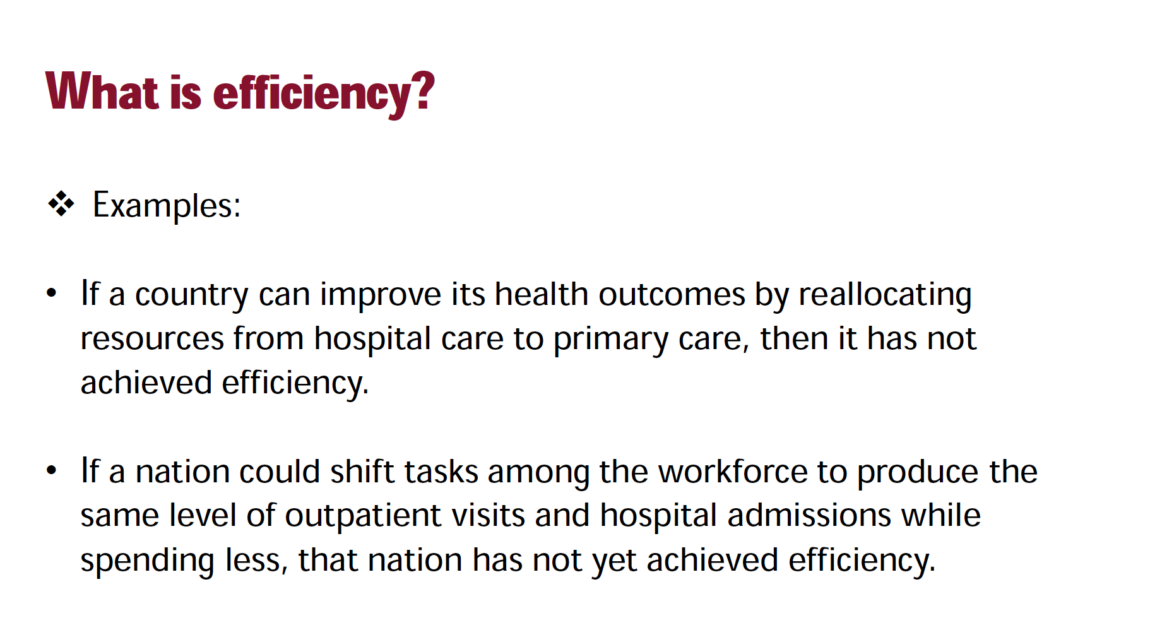Overview
Conducting a data-driven analysis of a health system is critical for supporting health reform designs. This idea stems from the Control Knob Framework, where a health system is defined as “a set of relationships where the structural components (means) and their interactions are associated and connected to the goals the system desires to achieve (ends)”. Any successful reform, therefore, must be based on a systematic means-ends analysis. The first step in such an analysis is to evaluate health system performances, including three final goals (health status, citizen satisfaction, and financial risk protection) and three intermediate goals (access, efficiency, and quality of care). The intermediate goals are characteristics of the system that “are critical links in the chains that connect root causes to ultimate performance goals.” The objective of this session is to provide a practical guide on how to assess the efficiency of a health system.
This session is intended for analysts interested in conducting a diagnosis of a healthcare delivery system, and thus, will focus on the issues of measurement and analysis of efficiency. Despite the recent emphasis on the need for efficiency in individual health organizations and the health system as a whole, there is a surprising absence of a standardized approach to measuring efficiency or of a comprehensive list of widespread efficiency measures. This session will fill this gap by introducing analysts to commonly used metrics that can capture the significant forms of inefficiency rampant in the delivery of healthcare around the world.
The session will start with a brief overview of the concept of efficiency and its importance. It will then introduce the most commonly used efficiency indicators, followed by a discussion of the limitations of these existing methods. The main focus of the session will be exploring how analysts can construct simple yet meaningful efficiency indicators in the context of the Indian healthcare delivery system.
Participants will gain practical experience in the entire process of assessing efficiency, starting from obtaining data to analyzing the data. In addition to learning how to construct efficiency indicators, the participants will be introduced to a list of the efficiency indicators that are frequently cited in peer-reviewed and grey literature. This webinar is intended to guide analysts through the process of measuring and analyzing efficiency while acknowledging the complexities of health systems and the data-related challenges that exist in most countries.
Reading
- Aloh, H. E., Onwujekwe, O. E., Aloh, O. G., & Nweke, C. J. (2020). Is bed turnover rate a good metric for hospital scale efficiency? A measure of resource utilization rate for hospitals in Southeast Nigeria. Cost Effectiveness and Resource Allocation, 18(1), 21. https://doi.org/10.1186/s12962-020-00216-w
- Hafez, R. (Ed.). (2020). Measuring Health System Efficiency in Low- and Middle-Income Countries: A Resource Guide. Joint Learning Network for Universal Health Coverage, International Decision Support Initiative (iDSI), The World Bank Group. https://www.jointlearningnetwork.org/resources/resource-guide-for-measuring-health-system-efficiency-in-low-and-middle-inc/
- McGlynn, E. A., Shekelle, P. G., Chen, S., Goldman, D. P., Romley, J. A., Hussey, P. S., de Vries, H., Wang, M. C., Timmer, M. J., Carter, J., Tringale, C., & Shanman, R. M. (2008). Identifying, Categorizing, and Evaluating Health Care Efficiency Measures. McGlynn. https://www.rand.org/pubs/external_publications/EP20080418.html
- Selvaraj, S., Mukhopadhyay, I., Kumar, P., Aisola, M., Datta, P., Bhatt, P., Mehta, A., Srivastava, S., & Pachauli, C. (2014). Universal access to medicines: Evidence from Rajasthan, India. WHO South-East Asia Journal of Public Health, 3, 3–4. https://doi.org/10.4103/2224-3151.206752
- World Health Organization, Anand, S., & Fan, V. (2016). The health workforce in India. World Health Organization. https://apps.who.int/iris/handle/10665/250369
- Yip, W., & Hafez, R. (2016). Reforms for improving the efficiency of health systems: Lessons from 10 country cases. World Health Organization. http://www.who.int/health_financing/documents/synthesis_report/en/
Experience This Session
- View presentation slides here: HSA Session 8.
- Watch seminar session here.
